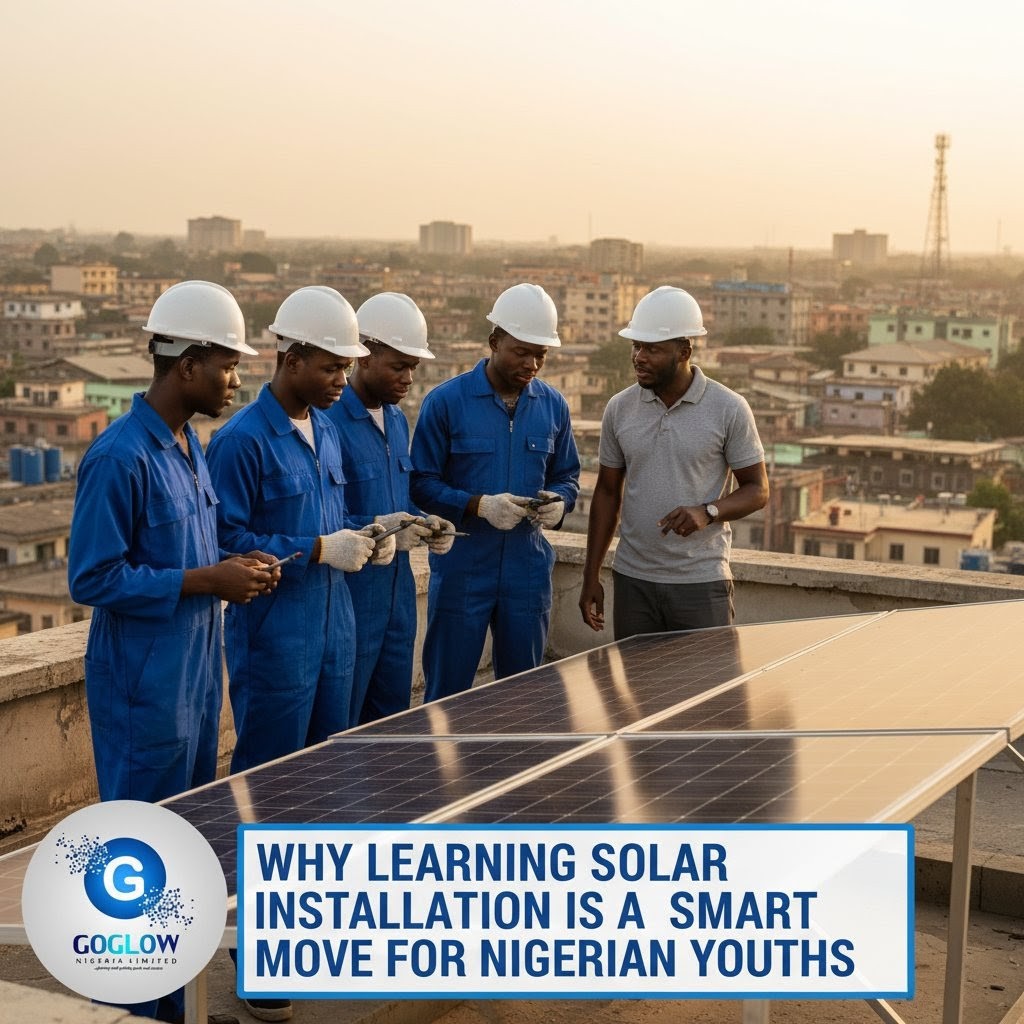
Nigeria has always had energy — plenty of it in the form of oil — but reliable electricity for homes, schools and businesses remains a major challenge. That gap has created one of the fastest-growing practical opportunities for young people: learning how to design, install and service solar systems. Below I explain why solar installation is a smart career move for Nigerian youths, what skills you’ll need, where the demand is, and practical next steps you can take right now.
1. There’s a real, everyday problem that needs solving
Frequent blackouts, grid collapses and long hours without power are part of daily life for many Nigerians. Households and businesses lose productivity and pay high costs for fuel-powered generators. In other words: the demand for reliable, affordable alternatives is persistent and widespread.
Why this matters for you: wherever there’s unreliable grid power, there’s someone willing to pay for a solar solution — whether a small home system, a business backup, or a mini-grid for a rural community.
2. The market is growing — and employers are hiring now
The off-grid and distributed renewable energy (DRE) sector in Nigeria is expanding. Large projects such as mini-grids and private renewable deals are being rolled out, while tens or even hundreds of smaller solar businesses recruit installers, technicians and sales/maintenance staff. Job boards and local hiring announcements show consistent listings for solar technicians and installers across Nigerian cities.
Why this matters for you: you don’t need to wait for “big” solar farms — small-to-medium solar companies and household customers create steady, local demand and entry-level job openings.
3. Solar skills let you earn multiple ways (employee + entrepreneur)
Learning solar installation opens several income routes:
Work as an employee for solar companies, EPC contractors, or energy NGOs.
Offer installation and maintenance services to homes and small businesses.
Sell and install pre-packaged Solar Home Systems (SHS) for local retailers.
Build micro-enterprises: battery swapping, inverter repair, wiring and earthing services, or mini-grid maintenance.
Why this matters for you: solar skills are portable and scalable — start with simple home systems, then grow to larger commercial or community projects.
4. Low barrier to entry with practical training and certification options
You don’t need a university degree to start. Many reputable training programs teach core competencies in a matter of weeks to months: PV fundamentals, system sizing, wiring, inverter and battery selection, safety and troubleshooting. Accredited short courses plus hands-on practice prepare you to pass industry safety checks and make clients confident in hiring you.
Tip: prioritize programs that include hands-on labs, safety gear, and a certificate recognized by employers or industry associations.
5. Solar is future-facing and climate-smart
Nigeria’s energy policy discussions and international investments increasingly favor renewables. Donor-supported projects, private-sector mini-grid deals and national renewables targets mean long-term demand for skilled technicians and entrepreneurs in clean energy. Choosing solar helps you build a future-proof skill set aligned with global trends.
6. Real social impact — help communities and create local value
Beyond income, solar installers provide enormous social value: powering clinics, schools, shops and lighting streets. This creates employment ripple effects: more evening study hours for students, longer working hours for businesses, safer communities — and that makes your work visible and highly valued locally.
7. Practical skills you’ll learn (what a solid course covers)
A good solar installation training program should teach:
Solar PV basics: panels, inverters, batteries, charge controllers
Site assessment & system sizing (how much panel & battery a home needs)
Electrical wiring, earthing, and protection devices
Installation best practices: mounting, orientation, tilt, and rooftop safety
Battery care and battery-inverter integration (including lithium vs lead-acid basics)
Troubleshooting, preventive maintenance and testing
Health & safety: PPE, ladders, safe electrical practices
Business skills: costing, proposals, customer communication, after-sales service
8. How to get started this month — a practical 5-step plan
1. Find a short practical course — choose one with hands-on labs and a certificate. (Look for local training hubs, REA-backed programs, or industry scholarships.)
2. Buy a starter toolkit — multimeter, insulated screwdrivers, PPE, and basic mounting tools. Practice on demo kits.
3. Partner with an installer — apprentice for 2–3 months on real jobs to build a portfolio.
4. Offer small jobs first — start with lighting, phone-charging systems, and single-room solar kits. Charge transparently and build referrals.
5. Scale — reinvest earnings into training, marketing, a helper, and larger systems.
9. Safety, certification and customer trust
Always work within safety standards — improper installations risk fires, injury, and loss of reputation. Encourage customers to insist on certified installers and provide warranties for labor. Certification and visible safety practice are what make clients choose you over an informal competitor.
10. What Goglow Hub can do for you
At Goglow Hub we teach practical, industry-relevant skills that match local realities — short, hands-on classes, realistic system labs, and simple business lessons on how to price jobs and win customers. If you want, we can help design a beginner-friendly 2–6 week solar installer track that includes:
Hands-on PV lab (site visits + rooftop practice)
Safety & electrical basics (with PPE supplied)
Business & proposal writing for installers
Job-placement support: introductions to local solar companies & customers
Final encouragement
Learning solar installation is not just a job skill — it’s a way to turn Nigeria’s energy problems into local opportunities. For a young person willing to learn practical skills, work safely, and hustle honestly, solar installation offers immediate work, a path to entrepreneurship, and a chance to make a visible, positive impact in your community.